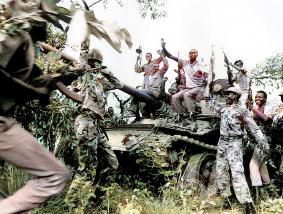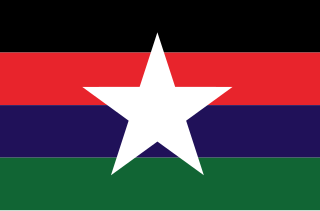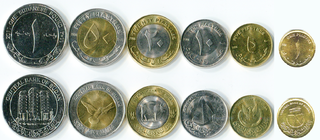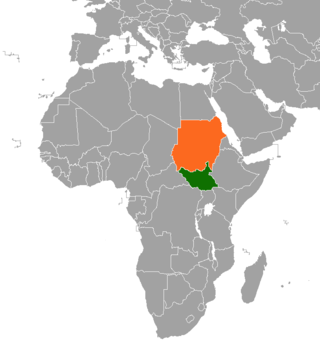Related Research Articles

Sudan, officially the Republic of the Sudan, is a country in Northeast Africa. It borders the Central African Republic to the southwest, Chad to the west, Egypt to the north, Eritrea to the northeast, Ethiopia to the southeast, Libya to the northwest, South Sudan to the south, and the Red Sea. It has a population of 45.7 million people as of 2022 and occupies 1,886,068 square kilometres, making it Africa's third-largest country by area and the third-largest by area in the Arab League. It was the largest country by area in Africa and the Arab League until the secession of South Sudan in 2011; since then both titles have been held by Algeria. Its capital city is Khartoum, and its most populous city is Omdurman.
Telecommunications in Sudan includes fixed and mobile telephones, the Internet, radio, and television. Approximately 12 million out of 45 million people in Sudan use the Internet, mainly on smartphones and mobile computers.

Omar Hassan Ahmad al-Bashir is a Sudanese former military officer and politician who served as the seventh head of state of Sudan under various titles from 1989 until 2019, when he was deposed in a coup d'état. He was subsequently incarcerated, tried and convicted on multiple corruption charges. He came to power in 1989 when, as a brigadier general in the Sudanese Army, he led a group of officers in a military coup that ousted the democratically elected government of prime minister Sadiq al-Mahdi after it began negotiations with rebels in the south; he subsequently replaced President Ahmed al-Mirghani as head of state. He was elected three times as president in elections that have been under scrutiny for electoral fraud. In 1992, al-Bashir founded the National Congress Party, which remained the dominant political party in the country until 2019. In March 2009, al-Bashir became the first sitting head of state to be indicted by the International Criminal Court (ICC), for allegedly directing a campaign of mass killing, rape, and pillage against civilians in Darfur. On 11 February 2020, the Sudanese government announced that it had agreed to hand over al-Bashir to the ICC for trial.


The Second Sudanese Civil War was a conflict from 1983 to 2005 between the central Sudanese government and the Sudan People's Liberation Army. It was largely a continuation of the First Sudanese Civil War of 1955 to 1972. Although it originated in southern Sudan, the civil war spread to the Nuba mountains and the Blue Nile. It lasted for almost 22 years and is one of the longest civil wars on record. The war resulted in the independence of South Sudan 6 years after the war ended.

John Garang de Mabior was a Sudanese politician and revolutionary leader. From 1983 to 2005, he led the Sudan People's Liberation Army (SPLA) after the Second Sudanese Civil War, the comprehensive peace agreement of 2005 was signed and he briefly served as First Vice President of Sudan for 3 weeks until his death in a helicopter crash on July 30, 2005. A developmental economist by profession, Garang was a major influence on the movement that led to the foundation of South Sudan.

Juba is the capital and largest city of South Sudan. The city is situated on the White Nile and also serves as the capital of the Central Equatoria State. It is the world's newest capital city to be elevated as such, and had a population of 525,953 in 2017. It has an area of 52 km2 (20 sq mi), with the metropolitan area covering 336 km2 (130 sq mi).

The Sudan Liberation Movement/Army is a Sudanese rebel group active in Darfur, Sudan. It was founded as the Darfur Liberation Front by members of three indigenous ethnic groups in Darfur: the Fur, the Zaghawa, and the Masalit, among whom were the leaders Abdul Wahid al Nur of the Fur and Minni Minnawi of the Zaghawa.

Salva Kiir Mayardit, also known as Salva Kiir, is a South Sudanese politician who has been the President of South Sudan since its independence on 9 July 2011. Prior to independence, he was the President of the Government of Southern Sudan, as well as First Vice President of Sudan, from 2005 to 2011. He was named Commander-in-Chief of the Sudan People's Liberation Army (SPLA) in 2005, following the death of John Garang.

The Sudanese pound is the currency of the Republic of the Sudan. The pound is divided into 100 piastres. It is issued by the Central Bank of Sudan.
As of the early 2000s, Sudan had one of the most restrictive media environments in Africa. Sudan’s print media since independence generally have served one of the political parties or the government in power, although there occasionally were outspoken independent newspapers.
Sudanese literature consists of both oral as well as written works of fiction and nonfiction that were created during the cultural history of today's Republic of the Sudan. This includes the territory of what was once Anglo-Egyptian Sudan, the independent country's history since 1956 as well as its changing geographical scope in the 21st century.

The War in Darfur, also nicknamed the Land Cruiser War, was a major armed conflict in the Darfur region of Sudan that began in February 2003 when the Sudan Liberation Movement (SLM) and the Justice and Equality Movement (JEM) rebel groups began fighting against the government of Sudan, which they accused of oppressing Darfur's non-Arab population. The government responded to attacks by carrying out a campaign of ethnic cleansing against Darfur's non-Arabs. This resulted in the death of hundreds of thousands of civilians and the indictment of Sudan's president, Omar al-Bashir, for genocide, war crimes, and crimes against humanity by the International Criminal Court.

Rebecca Nyandeng of Mabior is a South Sudanese politician. She has been one of the Vice Presidents of South Sudan in the unity government since February 2020. She served as the Minister of Roads and Transport for the autonomous government of Southern Sudan, and as an advisor for the President of South Sudan on gender and human rights from 2007 to 2014. She is the widow of Dr. John Garang de Mabior, the late first Vice President of Sudan and the President of the Government of South Sudan, and the mother of Akuol de Mabior. She is from the Dinka tribe of Twic East County of South Sudan.

The 2011–2013 protests in Sudan began in January 2011 as part of the Arab Spring regional protest movement. Unlike in other Arab countries, popular uprisings in Sudan had succeeded in toppling the government prior to the Arab Spring in 1964 and 1985. Demonstrations in Sudan however were less common throughout the summer of 2011, during which South Sudan seceded from Sudan, but resumed in force later that year and again in June 2012, shortly after the government passed its much criticized austerity plan.

South Sudan, officially the Republic of South Sudan, is a landlocked country in East Africa. It is bordered by Ethiopia, Sudan, the Central African Republic, the Democratic Republic of the Congo, Uganda, and Kenya. Its population was estimated at 10,913,164 in 2022. Juba is the capital and largest city.

Bilateral relations between South Sudan and the Sudan were officially started on 9 July 2011 following South Sudan's independence. Sudan became the first country in the world to recognize the independence of South Sudan. However, relations between South Sudan and Sudan have still been poor, with both sides supporting rebel groups in the other's territory.
The mass media in South Sudan is underdeveloped compared to many other countries, including fellow East African states like Kenya, Tanzania, and Uganda. Poor transportation infrastructure and entrenched poverty in the country inhibit both the circulation of newspapers, particularly in states located far from the capital of Juba, and the ability of media outlets to maintain regular coverage of the entire country.

The Heglig Crisis was a brief war fought between the countries of Sudan and South Sudan in 2012 over oil-rich regions between South Sudan's Unity and Sudan's South Kordofan states. South Sudan invaded and briefly occupied the small border town of Heglig before being pushed back by the Sudanese army. Small-scale clashes continued until an agreement on borders and natural resources was signed on 26 September, resolving most aspects of the conflict.
References
- ↑ Karen, Fung. "Sudan newspapers and Africa on the internet". Stanford Junior University. Retrieved 2 June 2012.
- ↑ "Sudan newspapers and news on the internet". Stanford Junior University. Retrieved 2 June 2012.
- ↑ "Sudan Newspapers and News on the Internet". Archived from the original on 2007-09-19. Retrieved 2007-10-26.